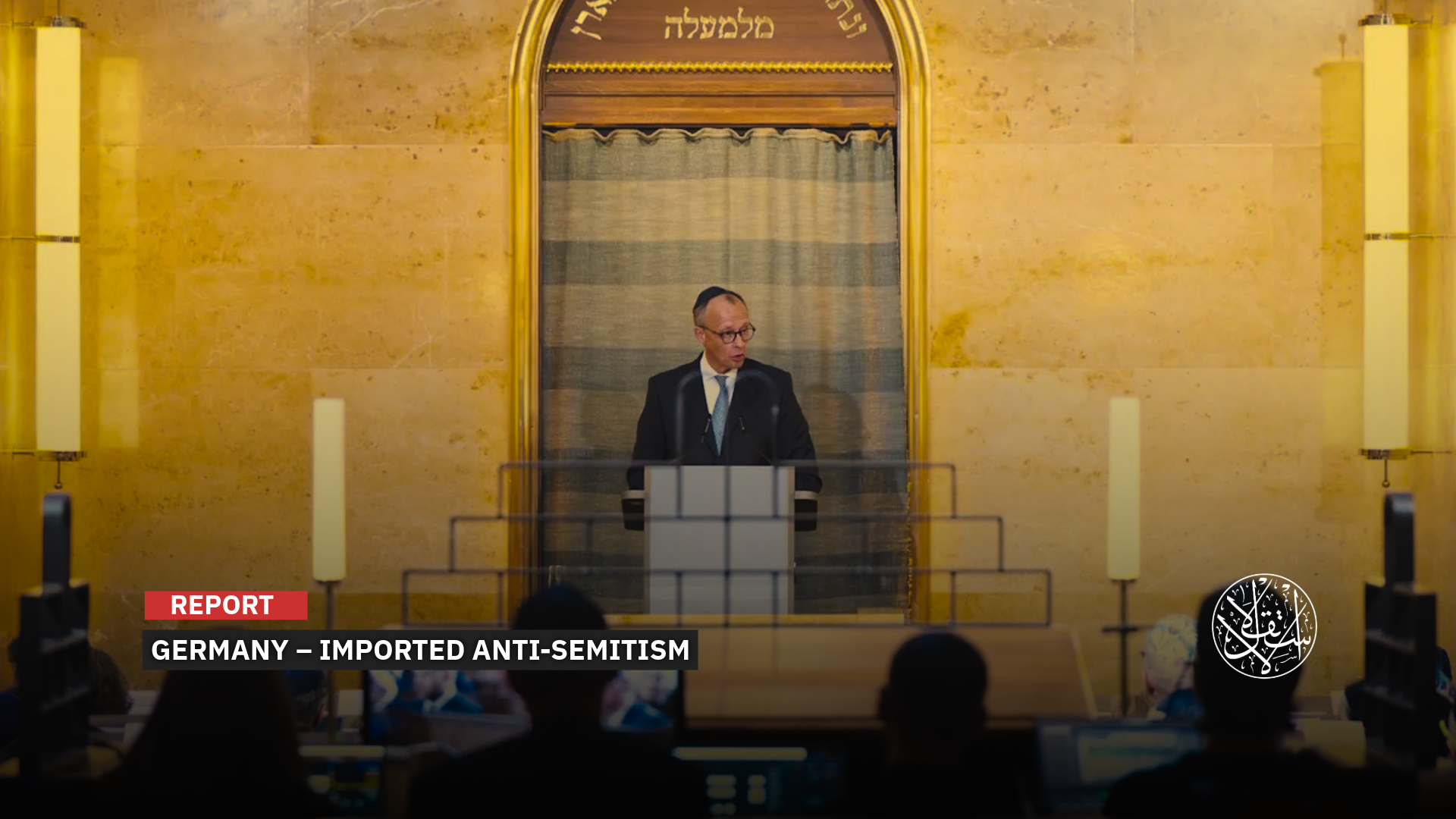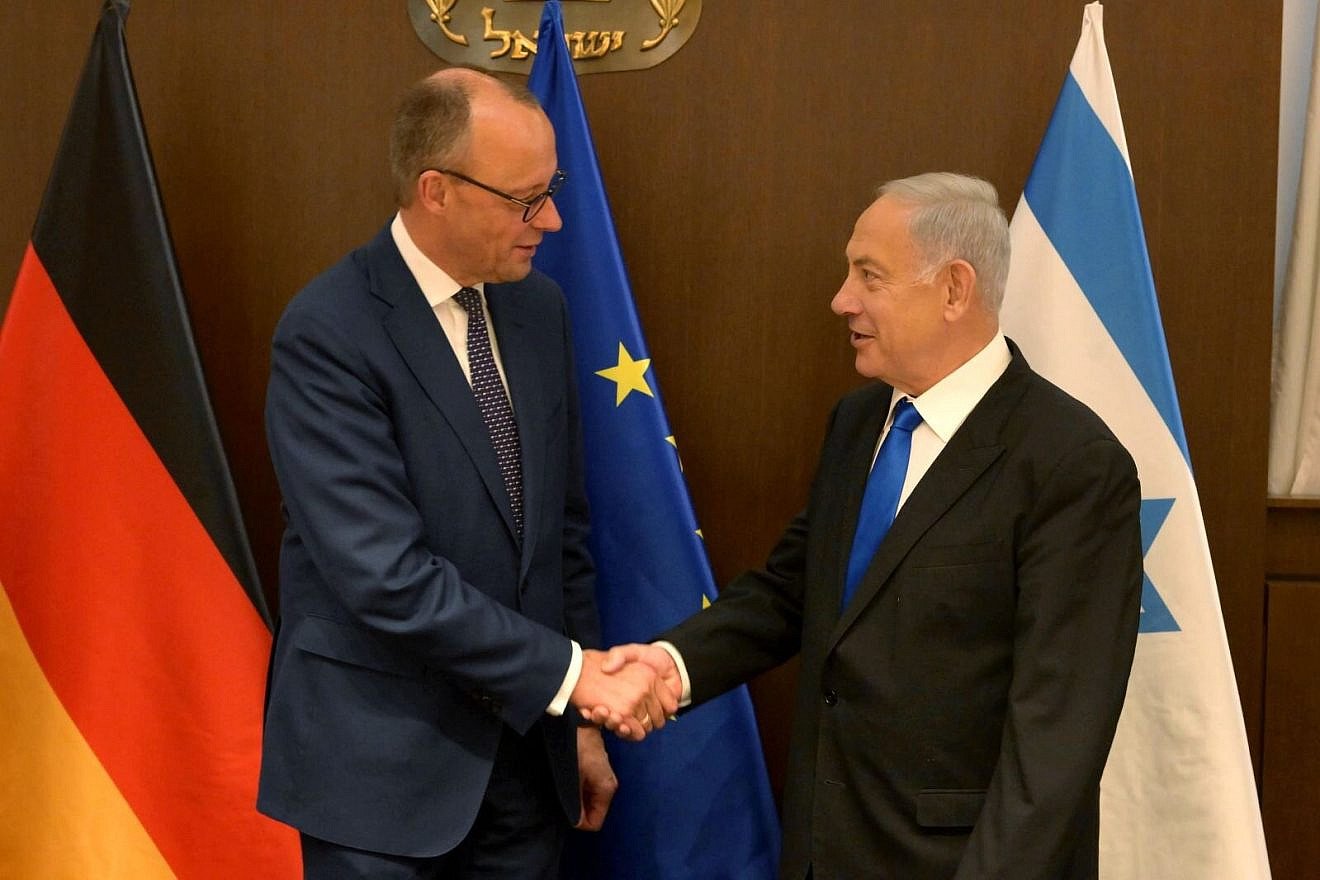Ignoring 'Israel’s' Genocide in Gaza: How Germany’s Friedrich Merz Declared War on Anti-Semitism

“85% of all antisemitic violence in Germany is committed by right-wing perpetrators.”
As Germany's chancellor nearly broke down in tears while reopening a synagogue in the south of the country, he declared an unprecedented war on all forms of anti-Semitism.
This came amid mounting international criticism of Germany for its disturbing silence on Israeli war crimes in Gaza, as well as Berlin's unconditional political and military support for Tel Aviv.
Chancellor Friedrich Merz pointed out that German society and politics had turned a blind eye for decades to the fact that a significant number of immigrants to Germany had grown up in countries where anti-Semitism was almost an official policy, and hatred of “Israel” was taught even to children.
Blaming immigrants for the rise of anti-Semitism offers German political leaders a convenient excuse for their own failure to confront entrenched antisemitic beliefs within German society.
The phrase ‘imported anti-Semitism’ has stirred controversy in Germany. It suggests that anti-Semitism is mainly a result of immigration, a view often echoed in right-wing circles.
German Commitments
A few days ago, German Chancellor Friedrich Merz appeared wearing a Jewish skullcap, solemnly recalling what his Nazi ancestors had done to a synagogue 87 years ago.
At a ceremony on the evening of September 15, marking the reopening of the synagogue on Reichenbachstraße in Munich, southern Germany, he expressed his deep concern about what he described as the resurgence of anti-Semitism in his country.
Among those attending the ceremony were the Bavarian Prime Minister Markus Soder, the Speaker of the Bavarian Parliament, Ilse Aigner, the Mayor of Munich, Dieter Reiter, the President of the Central Council of Jews in Germany, Josef Schuster, and the Israeli Ambassador, Ron Prosor.
Merz also pledged before those present to wage an unrelenting fight against all forms of old and new anti-Semitism in Germany.
“We know that the pogroms of November 1938 were merely the prelude to the crime against humanity that was the Holocaust, the systematic attempt to exterminate the Jewish people – a barbaric act. I want to tell you how ashamed I am of this,” he noted.
He pointed out that anti-Semitism had never disappeared from the Federal Republic of Germany, noting that an entire generation of Jews in the country had grown up under strict security measures, never knowing what normal public life looked like.
“We must not become accustomed to the fact that police presence in front of synagogues, schools, and Jewish cafes has become the norm. anti-Semitism cannot be categorized as freedom of art, culture, or any other domain,” he said.
“Like many in Germany, I wanted to believe that things would improve... but what happened on October 7, 2023 changed everything,” he added.
Merz described what happened then as the largest mass massacre of Jews since the Holocaust, stressing that some streets witnessed celebrations, revealing a deep flaw in German society and its policies regarding this issue.
He claimed that since that day, a new wave of anti-Semitism has emerged, encompassing both old and new forms, with statements and actions spreading widely on social media, in universities, and in public spaces.
He expressed his deep shame, not only as a politician, but as a German citizen who grew up with the motto ‘Never Again’, stating that this motto must be transformed into a real commitment.
“It is our collective duty to ensure that Jews in Germany can live, study, and celebrate without fear, and that a new generation of Jews grows up proud of their identity, wherever they are,” he said.
In turn, Markus Soder, leader of another faction within the Christian Democratic Union (CDU), stated: “We admire Israel for its way of defending itself. It is the only democracy in the Middle East.”
“Don’t forget the barbarity of what happened on October 7, and don’t forget those who were attacked. Know that if Israel stops fighting today, it will face another massacre tomorrow,” he added.
Estimates suggest that there are up to 250,000 Jews in Germany, but official figures indicate that the number of officially registered Jews does not exceed 95,000.
In recent years, the Central Council has made further structural progress for the Jewish community in Germany, including the opening and reopening of several synagogues.
Three years ago, the Bundeswehr, Germany's armed forces, had its first Federal Military Rabbi and Jewish chaplaincy.
A Jewish Academy is scheduled to open in Frankfurt am Main in the summer of 2026.
Every German state has an anti-Semitism office, reflecting its historical responsibility for the Nazi crimes against Jews.
Germany adheres to the International Holocaust Remembrance Alliance (IHRA) definition of anti-Semitism, which defines ‘hatred of Jews’ as its core.
However, the federal government added the following sentence to the definition: “The State of Israel, which is viewed as a Jewish entity, may be a target of such attacks.”

Anti-Semitism
In response to a report published last June on the virulence of anti-Semitism in Germany, Merz blamed the attitudes held by immigrants, vowing to combat this problem.
He stated in a Fox News interview that Germany has imported anti-Semitism with the big numbers of migrants we have within the last 10 years.
Merz's emphasis on so-called ‘imported anti-Semitism’ serves as a convenient diversion from Germany’s persistent failure to confront home-grown anti-Semitism.
His remarks also risk emboldening those who weaponize anti-Semitism as a rhetorical tool to fuel anti-immigrant sentiments.
It comes amid a reported rise in antisemitic crimes in Germany, with 8,627 incidents taking place last year, a 77% increase on 2023 figures.
Of them, 5,857 of the crimes were classified as anti-Semitism related to “Israel”, with 544 cases attributed to far-right extremists.
Since 1945, anti-Semitism in Germany has been primarily viewed as a far-right phenomenon until a rise of migration from Muslim-majority countries, many of whom are critical of Israeli war crimes, saw the supposed issue of so-called ‘imported anti-Semitism’ come to the fore.
Muslim and immigrant groups have condemned the term, viewing it as racist and ignorant of historic and contemporary European anti-Semitism.
Recently, German President Frank-Walter Steinmeier urged all people of Arab descent in Germany to denounce anti-Semitism and condemn Hamas.
Vice Chancellor Robert Habeck warned Muslims even more explicitly, stating that they would not be tolerated in Germany unless they rejected anti-Semitism.
In 2024, the German parliament adopted a controversial ‘Never Again is Now’ resolution to fight anti-Semitism.
This resolution failed to acknowledge the surely vital fact that 85% of all antisemitic violence in Germany is committed by right-wing perpetrators, and instead promised to combat anti-Semitism by exploiting repressive options in asylum and citizenship law.

Significant Support
Germany has long been one of Israel’s most steadfast allies, a legacy of the Holocaust and of Germany’s decades-long effort to make amends for the murder of 6 million Jews.
In 2008, in the first address by a German chancellor to the Israeli parliament, Angela Merkel announced that ensuring Israel's security was part of the reason for Germany's existence as a state — a position that has been reiterated by German leaders ever since.
Since the Oct. 7 attack and Israel’s war in Gaza, German authorities have cracked down on some pro-Palestinian protests, and artists and writers critical of Israel have complained of censorship or loss of funding in Germany.
Last year, Germany amended its citizenship test to include questions about Judaism, anti-Semitism and Germany’s support for “Israel”.
The state of Saxony-Anhalt began requiring a written commitment to the right of the State of Israel to exist for naturalization.
During his campaign for chancellor, Merz criticized the incumbent government for being an insufficient ally to “Israel”.
“In the future, Israel will receive what it needs to exercise its right of self-defense. The term ‘reason of state’ will once again be measured by actions, not just words,” he promised.
In February, Merz pledged to help Israeli Prime Minister Benjamin Netanyahu challenge an arrest warrant issued by the International Criminal Court (ICC) if he visited Germany.
Merz's statements after becoming the new chancellor have brought renewed attention to the historical concept that Israel's security is part of Germany's national interest.
As German officials continued to voice nearly unqualified support for Israel during the Gaza war, public opinion began to shift.
A July poll found that three-quarters of Germans wanted the country’s government to put more pressure on Israel regarding humanitarian conditions in Gaza.
A majority of Germans also say their country should recognize Palestinian statehood, by 54 percent to 31 percent, with even more support among young Germans, according to a poll at the end of July.
Amid pressure from both the German public and European allies, Merz began to voice some criticism of Israeli aggression in Gaza.
He reportedly announced the partial arms suspension without consulting senior members of the CDU or CSU, leading to a rare outburst of public condemnation from within Merz’s own ranks.
Netanyahu joined the chorus of criticism, calling Merz a friend of Israel but charging that he buckled under the pressure of false TV reports and internal pressure from various groups.
The chancellor’s office sent out a three-page document, published by daily Welt, with additional explanations in hopes of heading off criticism.
“The principles of German policy towards Israel remain unchanged,” he told public broadcaster ARD in an interview.
“Berlin would continue to help Israel defend itself”, Merz added.

From 2020 to 2023, Germany supplied approximately one-third of all arms exports to Israel, making it Israel's largest arms supplier in Europe.
In 2023, and particularly after October 7, German arms sales to Israel increased tenfold.
The Tagesspiegel newspaper recently published a poll indicating that more than half of Germans oppose exporting weapons to Israel.
However, German Foreign Minister Johann Wadephul later promised that his country would send more arms to Israel despite growing international calls for a weapons embargo.









